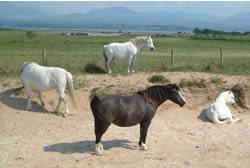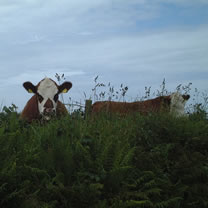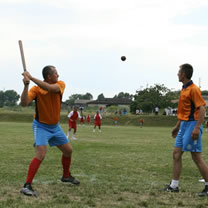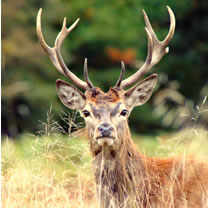
Today I saw a post on Facebook asking why words for horse are so different in languages like English and German, so I thought I’d investigate.
In English horse-related words include horse, stallion (male horse), mare (female horse), foal (young horse), filly (young female horse), colt (young male horse), pony (a small breed of horse), palfrey (a small horse with a smooth, ambling gait) and equine (a horse or horse-like animal; related to horses).
Horse comes from the Middle English horse / hors, from the Old English hors (horse), from the Proto-Germanic *hrussą (horse), from the Proto-Indo-European *ḱr̥sos (horse), from Proto-Indo-European *ḱers- (to run) [source]. This is also the root of the Proto-Celtic word *karros (wagon), from which we get the Latin currus (chariot, wagon), and the English words car, cart and chariot, and related words in other languages.
Stallion comes from the Middle English stalion, from the Middle French estalon and is of Germanic origin [source].
Mare comes from the Middle English mare / mere, from the Old English mere / miere (female horse, mare), from the Proto-Germanic *marhijō (female horse) [source].
Foal comes from the Middle English fole, from the Old English fola, from the Proto-Germanic *fulô, from the Proto-Indo-European *pōlH- (animal young) [source]
Filly comes from the Old Norse fylja [source].
Colt comes from the Old English colt (young donkey, young camel), from the Proto-Germanic *kultaz (plump; stump; thick shape, bulb), from the Proto-Indo-European *gelt- (something round, pregnant belly, child in the womb), from *gel- (to ball up, amass) [source].
Pony comes from the Scots powny, from the Middle French poulenet (little foal), from the Late Latin pullanus (young of an animal), from pullus (foal) [source].
Palfrey comes from the Anglo-Norman palefrei (steed), from the Old French palefroi, from the Late Latin paraverēdus (post horse, spare horse) [source].
Equine comes from the Latin equīnus (of or pertaining to horses), from equus (horse) [source].
The equivalent words in other European languages include:
Germanic languages
| |
German |
Dutch |
Danish |
Norwegian |
Swedish |
Icelandic |
| horse |
Pferd |
Paard |
hest |
hest |
häst |
hestur |
| stallion |
Hengst |
hengst |
hingst |
hingst |
hingst |
graðhestur |
| mare |
Stute |
merrie |
hoppe |
hoppe |
sto
märr |
hryssa |
| foal |
Fohlen |
veulen |
føl |
føll
fole |
föl |
folald |
The German word Pferd and the Dutch paard come from the Middle High German phert / pherit / pferift (riding horse), from the Old High German pherit / pfarifrit / parafred, from the Late Latin paraverēdus (substitute post horse) [source], from para-, from the Ancient Greek παρά (from, by, near) & verēdus (a fast or light breed of horse), from the Proto-Celtic *uɸorēdos (horse) [source], *uɸo- (under) & *rēdo- (to ride; riding, chariot), from the Proto-Indo-European *(H)reydʰ- (to ride) [source].
The words hengst and hingst come from the Proto-Indo-European *ḱanḱest- / *kankest- (horse), which is also the root of the Welsh, Cornish and Breton words for mare, and of the Old English word for horse or stallion, hengest.
Romance / Italic languages
| |
French |
Italian |
Romanian |
Spanish |
Portuguese |
Latin |
| horse |
cheval |
cavallo |
cal |
caballo |
cavalo |
equus |
| stallion |
étalon |
stalone |
armăsar |
padrillo |
garanhão |
celo |
| mare |
jument |
giumenta
cavalla |
iapă |
yegua |
égua |
equa |
| foal |
poulain |
puldero |
mânz |
potro |
potro |
equuleus
equulus
pullus
vitulus |
In Latin there was another word for horse – caballus, which was only used in poetry in Classical Latin, and was the normal word for horse in Late and Vulgar Latin. It possibly comes from the Gaulish caballos [source]. This is also the root of the English words cavalry, cavalier, cavalcade and chivalry,
The word equus comes from the Proto-Italic *ekwos, from the Proto-Indo-European *h₁éḱwos (horse) [source].
Celtic languages
| |
Breton |
Cornish |
Welsh |
Irish |
Manx |
Scottish Gaelic |
| horse |
marc’h |
margh |
ceffyl |
capall |
cabbyl |
each |
| stallion |
marc’h |
margh |
march
stalwyn |
stail |
collagh
grihder |
greadhair |
| mare |
kazeg |
kasek |
caseg |
láir |
laair |
làir |
| foal |
ebeul |
ebel |
ebol |
searrach |
sharragh |
searrach |
The Scottish Gaelic word for horse, each, comes from the
Old Irish ech (horse), from Proto-Celtic *ekʷos (horse), from the Proto-Indo-European *h₁éḱwos (horse), which is also the root of the Breton, Cornish and Welsh words for foal.
The Breton marc’h (horse), the Cornish margh (horse) and the Welsh march (stallion) come from the Proto-Brythonic *marx (horse), from Proto-Celtic *markos (horse), from the Proto-Indo-European *márkos (horse). [source]. This is also the root of the Irish marcaigh (to ride), the Scottish Gaelic marcaich (to ride), and the Manx markiagh (to ride).
You can find more about Celtic words for horse on my Celtiadur blog
Slavic languages
| |
Bulgarian |
Czech |
Polish |
Russian |
Serbian |
Slovak |
| horse |
кон |
kůň |
kón
konno |
лошадь |
коњ |
kôň |
| stallion |
жребец |
hřebec |
ogier
rumak |
конь
жеребец |
жребец |
žrebec |
| mare |
кобила |
klisna |
klacz
kobyła |
кобыла |
кобила |
kobyla |
| foal |
жребец |
hříbě |
źrebak |
жеребёнок |
фоал |
žriebä |
The Russian word for horse, лошадь, is a borrowing from a Turkic language, probably Tatar [source].
The other Slavic words for horse come from the Proto-Slavic konjь (horse), of unceratin origin [source].
Other European languages
| |
Latvian |
Lithuanian |
Albanian |
Greek |
| horse |
zirgs |
arklys |
kalë |
άλογο
ίππος |
| stallion |
ērze |
erelis |
hamshor |
επιβήτορα |
| mare |
ķēve |
kumelė |
merak |
φοράδα |
| foal |
kumeļi |
kumeliukas |
pjellë |
πουλάρι |
Sources: Reverso, Linguee, bab.la, Google Translate








